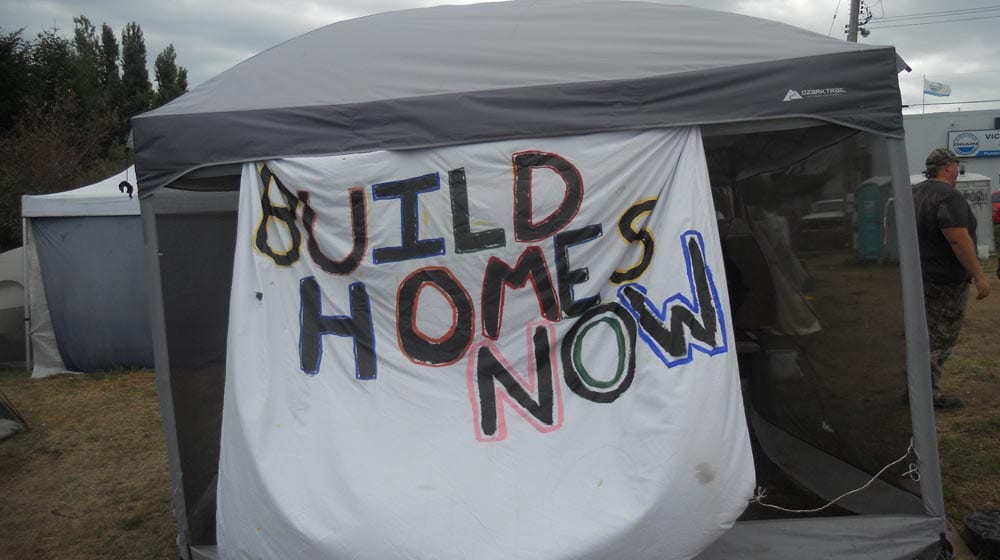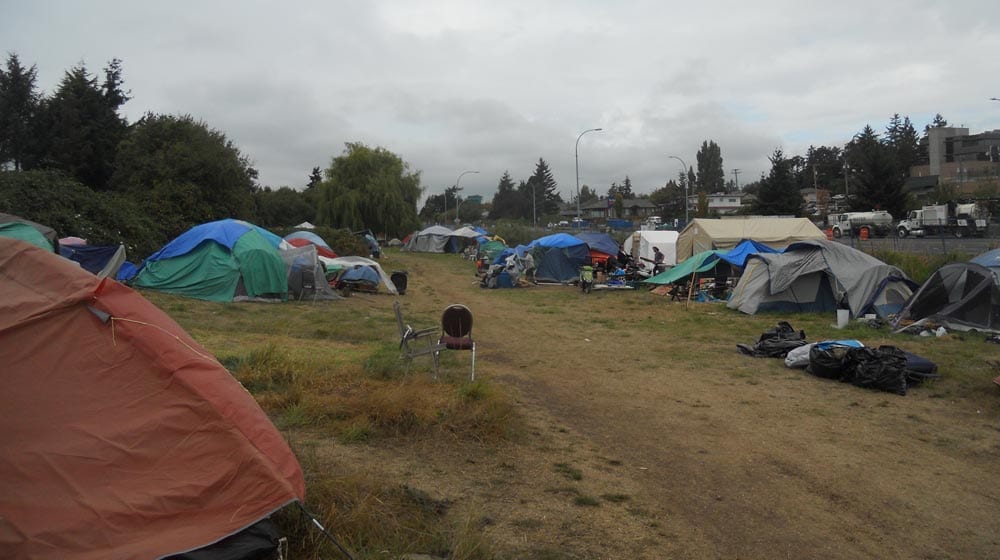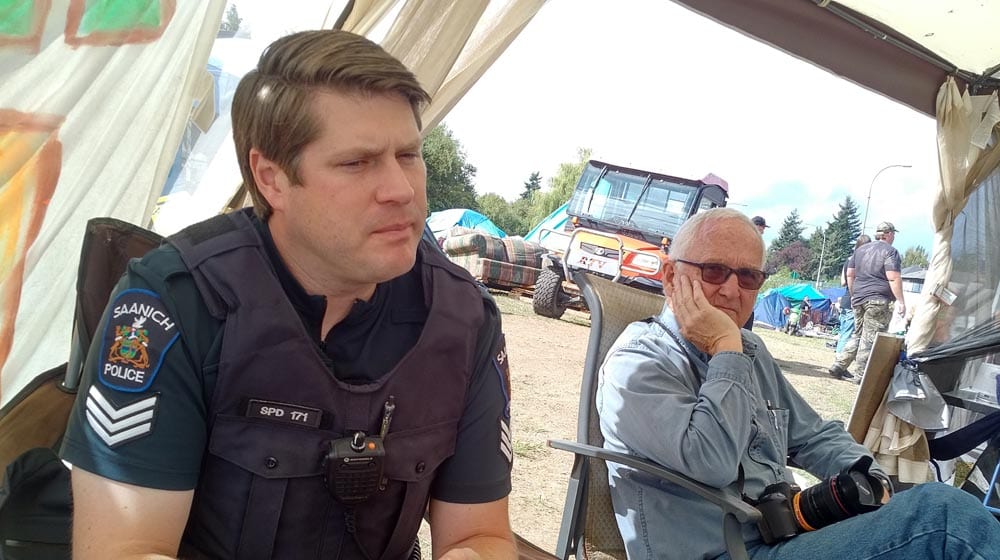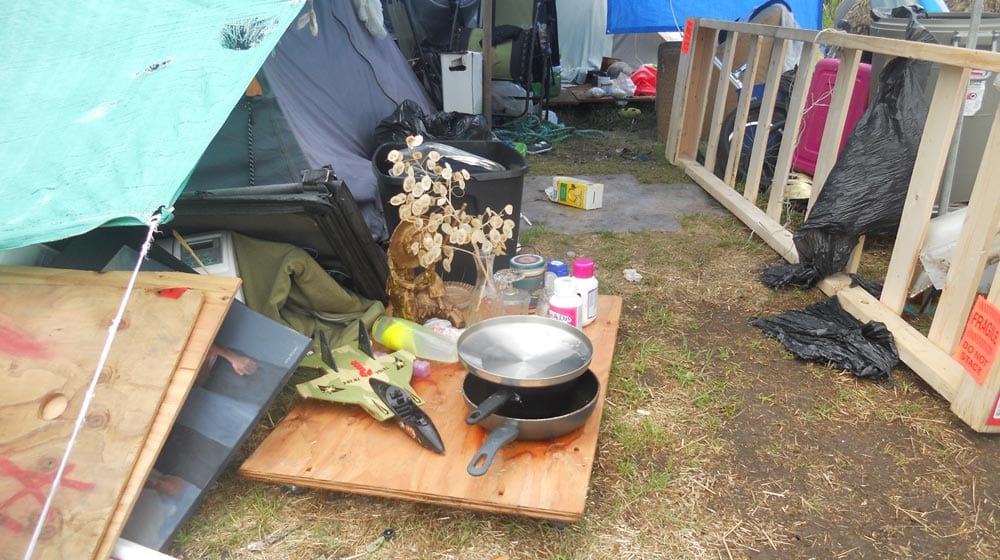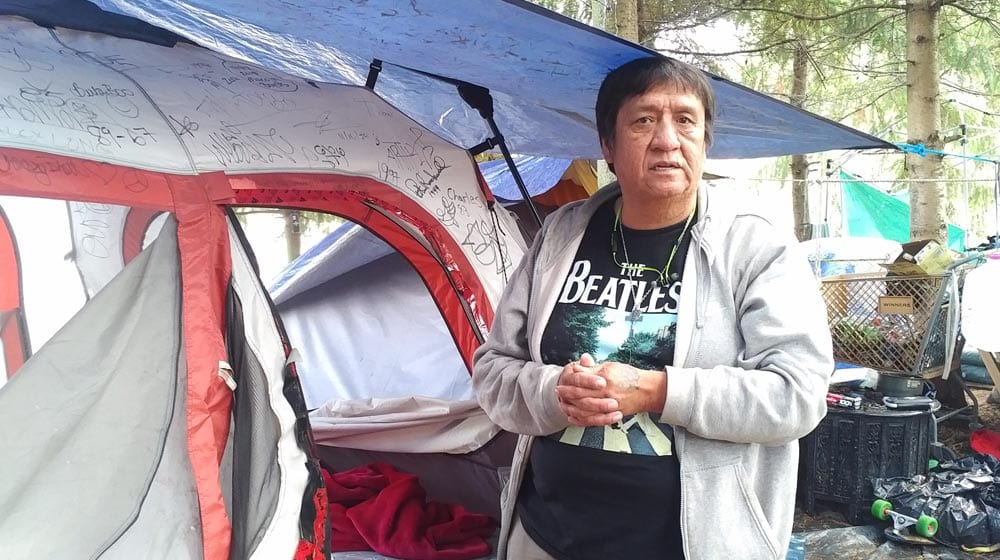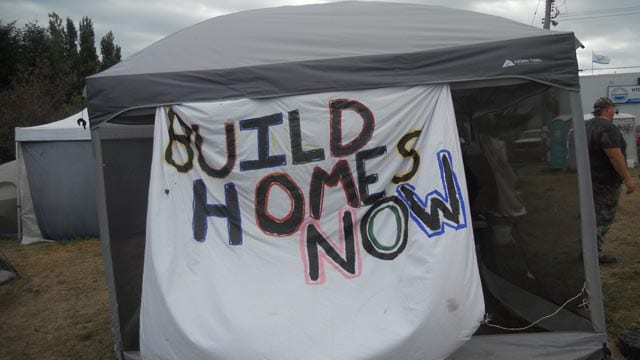
From the road it looks like a refugee camp.
Nylon tents and makeshift shelters flatten the grass in Regina Park, where about 120 homeless people live in a small tent city in the District of Saanich.
A hand-printed sign says the park, which overlooks the Trans-Canada Highway, has been seized for “breach of Territorial Law.”
That’s a nod to the way settlers cleared Canada, says camp spokeswoman Chrissy Brett.
“Indigenous, homeless people face systemic, colonial, white-washed hate in displacement from governments, from municipalities, from the province and the federal government,” she says.
(Chrissy Brett is a spokesperson for the tent city residents. Photo: Kathleen Martens/APTN)
William Billie and his 19-year-old son, Trevor, are from the Nam’gis First Nation further north on Vancouver Island and live in a tent facing the busy road.
They say people in passing cars shout insults at them.
“One day I heard a person say, ‘Oh, look it. You Native people are making Victoria look bad’,” says Billie.
“Some trucker drivers lay on the horn,” says Brett.
“At 3 in the morning that’s not a supportive honk.”
Ordered to Leave
Despite the problems the vibe remained upbeat Monday as they faced a court-ordered deadline to vacate the park by 7 p.m. Tuesday.
Some people were busy packing up but others planned to defy the injunction.
“We run smoothly and with our own laws,” says Charles Walkus of the community they call Camp Namegans, which means ‘we are one.’
Brett says they were invited to shelter here on unceded Coast Salish territory.
“We are trying to support people the government failed,” she says, reciting a litany of reasons people find themselves on the street.
“Some people were ‘reno-victed’, lost their jobs, don’t have money for a deposit, don’t feel safe in homeless shelters, are day labourers, or don’t want to be separated as couples.”
(Tent city in Saanich, B.C. Photo: Kathleen Martens/APTN)
This camp is one of about half a dozen tent cities in B.C, where mortgages and rent are among the highest in Canada.
Homeless people want the right to live legally in a park when housing isn’t available to them, says Brett.
She says Camp Namegans gives people the freedom to leave and apply for services – even look for housing – while their tent and belongings are protected.
“This is a stable place where people have a roof over their heads. They don’t have to worry about their things being ransacked by other homeless people or parks (staff) or police (officers).”
It also gives people a chance to stay in one place and maybe dry out or come off drugs, she adds.
No Serious Crimes
Brett, a Nuxalk woman and the camp founder, says contrary to what some politicians and police officers say the camp is violence and fatal-overdose free.
“This is way safer than government-run programs that are out there because we treat people with humanity, kindness and compassion,” she says.
Sgt. Andy Stuart, with the Saanich police community engagement division, has been coming regularly to check in with residents.
He says he’s reviewed the findings of the Truth and Reconciliation Commission to help him “recognize past harms” while working “with today’s problems.”
“What’s happened in the past doesn’t fit very well with the current laws of Canada and municipal bylaws,” says Stuart.
(Sgt. Andy Stuart of the Saanich Police Service. Photo: Kathleen Martens/APTN)
Brett says that shows how these camps are educating public officials about homelessness.
And Indigenous issues.
“They have a choice in how they deal with us,” she says. “We’ve been here since May and they need our co-operation and compliance.”
Earlier this summer, Brett was charged with assault and obstruction of justice after blasting an air horn when firefighters were responding to an emergency in camp.
She says she was using it as a teachable moment.
“They arrested me but he was going to throw away what he said was garbage. Those were somebody’s belongings.”
Still, police say homeowners near the camp are reporting an increase in property crime. And the Saanich Police Service has identified a street gang member in camp they are concerned about.
Brett says simply he is homeless like the rest of them.
Stay in One Place
Billie says living in this tent city with his son has been a gift.
“This has been like a home,” he says of his three months in the park where someone gave him a single mattress to sleep on.
“I don’t have to take down my tent and pack my suitcase and drag it all around everywhere, every day.”
(William Billie stands outside his tent covered in signatures. Photo: Kathleen Martens/APTN)
Workers with various social organizations could be seen in the park Monday trying to help.
But Brett says employees with the big ones – municipal and provincial housing and social welfare agencies – don’t make house calls.
“Some of us refer to those organizations as ‘poverty pimps’ because their outreach services require people to go in to them if you want services,” she says.
“If you have services and you’re an outreach service why do I have to go to your office when your (clients) are on the street, they are here, they are in parks.”



